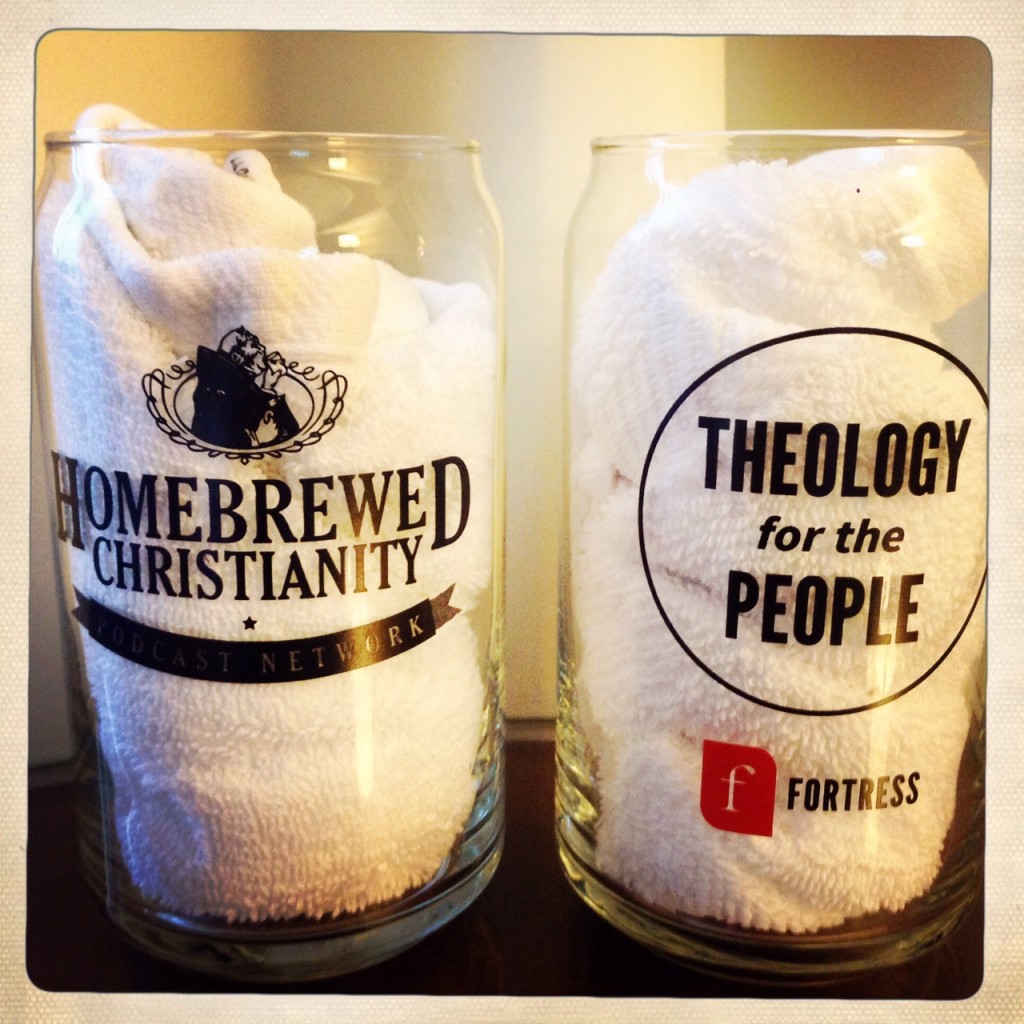This week, Scot Miller is blogging about Robert Gagnon’s book, The Bible and Homosexual Practice: Texts and Hermeneutics, which many readers of this blog are sure will convince Scot and me that we’re wrong about the gays. -TJ
I have really tried to be charitable to Gagnon’s book in my blog posts. Maybe I’ve been too charitable, since Gagnon doesn’t just “overstate” the conclusions in his biblical exegesis. He relentless forces all of the evidence into arguments that seem intended to annihilate even the possibility of an alternative interpretation.
It is more difficult for me to be charitable with his fifth chapter, however. In this last chapter — about one-third of his book — Gagnon attempts to refute as many arguments as he can think of which attempt to “override the Bible’s authority” by appealing to “general theological principles or contemporary scientific knowledge and experience” (p. 37).
While the first four chapters of Gagnon’s book could be read as an important contribution to biblical scholarship on homosexuality and sexual ethics, I’m afraid that the last chapter reads more like partisan talking points that can be used to attack and dismiss interpretations which differ with Gagnon’s particular interpretation of the Bible. Instead of seriously engaging the theological and modern scientific challenges to the Bible’s apparent position on homosexual practice, Gagnon’s mind is clearly made up, and he will come up with any argument he can, good or bad, to defend what he already thinks.
Chapter five does have a promising beginning. He believes the Bible is the most significant authority for believers, a sentiment I share (see my first first blog post on Gagnon). He also admits that “the Scriptures contain significant internal tensions at points” due to the fact that the Bible was “compiled over millennium, from diverse locations, and by many different writers” (p. 345). He also admits that believers aren’t bound to embrace the pre-scientific cosmology in the Bible, that there is a difference between the historical Jesus and the different characters of “Jesus” in each of the gospels, and that Paul “does not (and did not in the first century) have to be inerrant in every matter,” especially since Gagnon recognizes problems with Paul’s exegesis of the Hebrew Bible (p. 345).
Gagnon moreover affirms that it is a mistake to simply quote the Bible and think that settles everything. Good interpretation requires two-way dialogue between the Bible and contemporary culture and knowledge (while Gagnon defers to the authority of the Bible over all other evidence). I fully agree with Gagnon when he writes, “I cannot be a biblical literalist or fundamentalist and still retain intellectual integrity” (p. 345).
So what went wrong? Gagnon seems to misunderstand the kind of material he’s dealing with when it comes to biblical texts and theological arguments. Texts and theological arguments are not like mathematical formula that have timeless meanings. Language is slippery. Translations are difficult. (As a philosopher, it’s interesting to me that both Continental philosophers like Hans-Georg Gadamer and Anglo-American pragmatists like W.V.O. Quine agree on the difficulty of translating anything with complete accuracy. Gadamer argues in Truth and Method that “every translation is at the same time an interpretation” [p. 384], and in Word and Object Quine speaks of the “indeterminacy of translation” [pp. 72-79].)
The best anyone can do is come up with likely interpretations that are subject to revision based on better evidence and arguments. With any luck, your interpretation may become widely accepted and a consensus can form around it, but even a consensus is historically conditioned and subject to correction and rejection later.
Gagnon wants to convince us that the theological and scientific arguments which reject his way of reading the Bible must be wrong because they contradict his conclusion about homosexual practice. In fact, the alternative arguments are really proposals or suggestions that may actually allow us to read the Bible more adequately. It is a mistake for Gagnon to understand these arguments as ways of undermining the Bible’s authority. They are rather different ways of valuing the authority of the Bible.
For example, the first four arguments he tries to refute deal with the fact that our contemporary culture and knowledge is significantly different from the different worlds and cultures reflected in the Bible. Gagnon tries desperately to refute even the possibility that the Bible condemns only exploitative or pederastic forms of homosexuality (pp. 346-61), or that homosexuality was perceived as a threat to male dominance in the biblical worlds (pp. 361-80), or that the biblical writers thought that homosexual practices were a result of over-sexed heterosexuals (pp. 380-395). (Even though he argued against the idea that the ancient writers thought that homosexual practices were considered excesses of hyper-sexual heterosexuals, I thought the original argument was still more persuasive than Gagnon’s refutation of it.) All he really demonstrates is that he can offer an internally consistent reading of the texts that differs from these interpretations, not that these interpretations are conclusively defective.
The weakest section of the book concerns his response to the argument that “homosexuality has a genetic component that the writers of the Bible did not realize” (pp. 395-432). Instead of relying on research peer reviewed journals (and accepted by the American Psychological Association and the American Medical Association and the American Academy of Pediatrics), Gagnon’s argument here rests on the dubious work of people like the widely criticized Paul Cameron, who tries to demonstrate that homosexuals threaten public health, social order, and the well-being of children.
Appealing to people like Cameron, whose conclusions are at odds with other published research and not accepted by the psychological and medical communities is like trying to prove that vaccines cause autism by appealing to someone like Andrew Wakefield, who fraudulently “proved” that the MMR vaccine causes autism. In fact, the overwhelming empirical evidence is clear: there is no relationship in the data between vaccines and autism. In the same way, Gagon’s reliance on dubious sources, and his failure to deal with all sides of the debate on the genetic origins of same-sex orientation weakens his argument.
But my biggest complaint is his apparent misunderstanding of the analogy between the interpretation of slavery and homosexuality in the Bible. I’m not sure if he’s obtuse or intentionally misrepresenting the analogy, but it should be easy to understand. As I hope you guessed from my second post on Gagnon, I think the “sin” of homosexuality and the “support and acceptance” of slavery have been completely misinterpreted by some Christians. Gagon seems to think it’s a bad analogy because slavery is nothing like homosexuality (pp. 443-52). But the analogy isn’t between slavery and homosexuality; the analogy is between how Christians have interpreted the Bible on slavery and how Christians have interpreted the Bible on homosexuality. The analogy is about two defective ways of interpreting scripture.
The fact is, slavery was an unquestioned cultural practice in the biblical world. In spite of Gagnon’s attempt to downplay the significance of slavery in the Bible, there is no verse anyone can find to overthrow the practice. (And while Gagnon tries really, really hard to make Paul sound like an abolitionist in Philemon, that argument is hardly believable.) No, the Southern Baptists had a good, Bible-sourced arguments in support of slavery. And Gagnon has good, Bible-sourced arguments to condemn the sin of same-sex practices. Having good, Bible-based arguments may be necessary for Christians, but it obviously isn’t sufficient for adequate Christian belief.
The biblical argument for abolition and the biblical argument against the sin of homosexual practice cannot be made by quoting particular scriptures (Where does God say that slavery should be abolished? Where does God say that same-sex couples are not sinning?) Rather, the scriptural appeals have to be made to a larger theological trajectory in scripture. That’s what the abolitionists had to do. And that’s what those [some] of us who reject the sin of homosexuality [try to] do.
Other people have offered biblically supported arguments for not condemning homosexuality or homosexual practices, so I won’t rehash those arguments. But if you’re interested in hearing these kinds of arguments, John Shore has an interesting essay, and Matthew Vines has a YouTube video (and transcript).
I’d like to offer one more post tomorrow about Gagnon, sin, and morality.
















